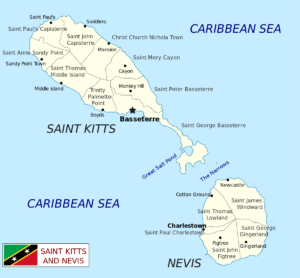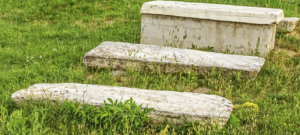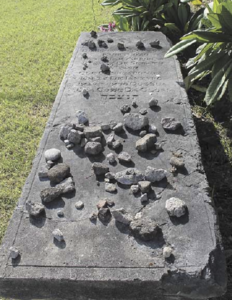 The islands that make up the Caribbean nation of St. Kitts and Nevis, while extremely small, still have a rich Jewish history. Settlement of Sephardic Jews expelled from Brazil in the 17th century, spearheaded the sugarcane industry. Jews arrived in the 17th century, bearing Hebrew names and Portuguese surnames. Jews brought the secrets of crystallizing sugar, to the islands. By the late seventeenth century this Jewish community was an established enclave complete with the communal necessities of a cemetery, a synagogue and a Jewish school in Nevis. The synagogue in Charlestown was estab;lished around 1684 and there was also a Jewish cemetery located on Government Road, which contains graves dating from 1679 to 1768.
The islands that make up the Caribbean nation of St. Kitts and Nevis, while extremely small, still have a rich Jewish history. Settlement of Sephardic Jews expelled from Brazil in the 17th century, spearheaded the sugarcane industry. Jews arrived in the 17th century, bearing Hebrew names and Portuguese surnames. Jews brought the secrets of crystallizing sugar, to the islands. By the late seventeenth century this Jewish community was an established enclave complete with the communal necessities of a cemetery, a synagogue and a Jewish school in Nevis. The synagogue in Charlestown was estab;lished around 1684 and there was also a Jewish cemetery located on Government Road, which contains graves dating from 1679 to 1768.
At its height, the Jewish community in St. Kitts numbered between 75 to 100 people and constituted around 25% of the islands’ total population. St Kitts was the home of one of the oldest Jewish Temples.
 Nevis’s sugar-based economy and the merchant class that depended upon it collapsed during the eighteenth century for a variety of political and economic reasons and two major earthquakes struck. The Jewish community dwindled. By the last half of the eighteenth century only three Jewish households remained. Many of the Jews relocated in North America’s British colonies.The existence of the Nevis Jewish community was virtually unknown to anyone save the inhabitants of Nevis surrounding islands until it was accidentally rediscovered in 1957 by the American Jewish historian.
Nevis’s sugar-based economy and the merchant class that depended upon it collapsed during the eighteenth century for a variety of political and economic reasons and two major earthquakes struck. The Jewish community dwindled. By the last half of the eighteenth century only three Jewish households remained. Many of the Jews relocated in North America’s British colonies.The existence of the Nevis Jewish community was virtually unknown to anyone save the inhabitants of Nevis surrounding islands until it was accidentally rediscovered in 1957 by the American Jewish historian.
In 1992, David Robinson, chief curator of the Nevis Historical and Conservation Society, spotted an unlocked door on a normally boarded-up stone structure on Nevis. Located on Main Street in the city of Charlestown and long known as the Jew’s Temple. The building had been used for government water and other storage. It was found that the building served as a mikvah, or Jewish ritual bath, and alongside were the remains of the oldest synagogue in the Caribbean.
 Due to the Jewish settlers, for centuries – up to the 1980s when the whole of the sugar industry came to a stop, the best sugar in the Caribbean because they brought to the island the technology of crystallisation. In the late 1980s Baron Edmund Rothschild built a distillery in St. Kitts to make a fine cane spirit unlike any other in the Caribbean. CSR, or Cane Spirit Rothschild, was distilled to a high purity and was advertised as A Unique Caribbean Vodka. About 1998 that distillery was closed and the St Kitts sugar factory has ceased production.
Due to the Jewish settlers, for centuries – up to the 1980s when the whole of the sugar industry came to a stop, the best sugar in the Caribbean because they brought to the island the technology of crystallisation. In the late 1980s Baron Edmund Rothschild built a distillery in St. Kitts to make a fine cane spirit unlike any other in the Caribbean. CSR, or Cane Spirit Rothschild, was distilled to a high purity and was advertised as A Unique Caribbean Vodka. About 1998 that distillery was closed and the St Kitts sugar factory has ceased production.
While Jews remain on the island today as hotel and resort owners and merchants, there is no active synagogue to service their needs. One hotelier held a Passover seder years ago for her own family and one or two friends. The event took on a life of its own and today is an annual event that the Jews of the island look forward to.